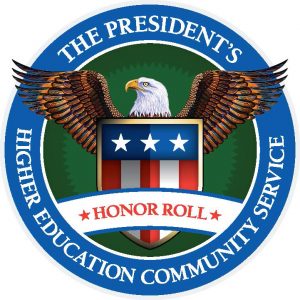 For the eighth consecutive year, Daemen College has been named to the President’s Higher Education Community Service Honor Roll, the highest federal recognition an institution can receive for its commitment to the community, service learning, and civic engagement.
For the eighth consecutive year, Daemen College has been named to the President’s Higher Education Community Service Honor Roll, the highest federal recognition an institution can receive for its commitment to the community, service learning, and civic engagement.
The national honor recognizes higher education institutions that support exemplary community service programs and raise the visibility of effective practices in campus community partnerships.
Daemen is one of only four institutions in the Buffalo Niagara region and among 35 colleges and universities across New York State to receive this national distinction in the 2015 general community service category.
“It is an honor to receive once again this prestigious national distinction, which is a reflection of the deep commitment and value we place on serving our communities,” said Daemen President Gary A. Olson. “Service learning is an integral part of the Daemen experience and our students are making a tremendous difference by contributing their time and talents to a wide range of efforts.”
During 2014-15, nearly 465 Daemen students engaged in almost 23,000 hours in service learning and community service activities, including initiatives established through 35 local and global service learning partnerships.
“We engage in service learning efforts every semester with our long-term community partners, which gives our students the unique opportunity to participate in 50 hours of service each semester in these disadvantaged communities where consistency is vital to the residents they serve,” said Cheryl Bird, executive director of the Daemen Center for Sustainable Communities and Civic Engagement.
The President’s Higher Education Community Service Honor Roll, which is awarded by the Corporation for National and Community Service (CNCS), recognizes institutions of higher education that support exemplary community service programs and raise the visibility of effective practices in campus community partnerships. CNCS oversees the award in collaboration with the U.S. Department of Education and the U.S. Department of Housing and Urban Development, as well as the American Council on Education, Campus Compact, and the Interfaith Youth Core.
